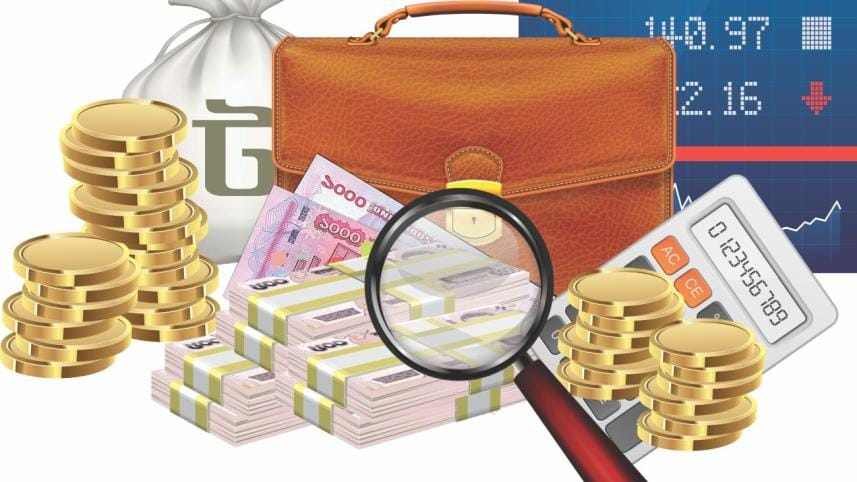Less ambitious, more realistic

In a break from the past, Finance Minister AHM Mustafa Kamal will set a more realistic revenue income target in his maiden budget, but may shy away from undertaking some much-needed economic reforms.
In the last several years, the government focused more on setting lofty revenue earning goals, only to fall way short at the year end.
In the first nine months of the current fiscal year, for example, the government has been able to collect only Tk 1,43,071 crore against the target of Tk 280,000 crore. This means, the government will have to collect the rest Tk 136,929 crore to achieve the target, which experts say is impossible.
So the new minister, who took charge in January, will set some less ambitious targets in the budget to be placed in parliament tomorrow.
For the next fiscal year, the revenue target has been set at Tk 377,810 crore, which is 17.92 percent more than that in the outgoing FY, according to the draft budget proposal.
In FY 2018-19, the original revenue target was Tk 3,39,280 crore, which was 25 percent higher than that in the previous fiscal year.
Of the revenue earning in the current FY, the National Board of Revenue will collect Tk 325,600 crore, which is around 16.28 percent higher than the revised collection target of Tk 280,000 crore in the current FY. The target was 31.64 percent higher in the current budget compared with the previous one.
Similarly, the size of the upcoming budget will grow by 18.22 percent whereas it was 25 percent in the outgoing fiscal year. Compared to the GDP, the size of the upcoming budget is 18.1 percent, down from 18.3 percent in 2018-19.
Zahid Hussain, lead economist at the World Bank’s Dhaka office, wants to see some structural reforms.
"Since this is the first budget of the re-elected government with a new election manifesto and a new finance minister, it is not unreasonable to expect a new beginning where major structural reform initiatives addressing the most pressing problems currently afflicting the economy will be the most distinguishing feature relative to the previous budgets," he told The Daily Star.
Prof Shamsul Alam, senior secretary at the Planning Commission, said he too expected that the government would take the necessary steps for economic reforms so that revenue earning increased in line with the GDP growth.
For example, the banking sector should be reformed in a way that it could play a supportive role in achieving a higher economic growth, he added.
“Our finance minister is dynamic and forward-looking. I believe he would be able to live up to the expectation,” he added.
In the coming budget, the finance minister will make some compromises as well.
Like in the previous years, more funds will be injected into state-run banks despite their continued financial irregularities and irresponsible lending practices.
In the last 10 years, the government injected more than Tk 17500 crore of taxpayers’ money into the state-run banks, although there has been hardly any improvement in their governance and lending practices.
In the coming fiscal year, some Tk 1,500 crore will be set aside to bail out these banks.
After a dillydally for seven years, the government is going to implement the new VAT law this time, but there will be several VAT rates, as in the existing laws.
Zahid Hussain said the original VAT law 2012 was drafted after much consultations with experts and stakeholders.
"Had it been implemented as passed by parliament in 2012, Bangladesh would have been a pioneer in modern VAT laws," he said.
But it is now clear that the law will be implemented after making several amendments, most of which appear to be in the wrong direction, he added.
"We hear the revisions include having different VAT rates at imports, production, wholesale and retail stages with input credit eligible only for the top 15 percent rate. This will reduce VAT to almost like an excise duty, bringing back the old and buried problem of taxes on taxes," he said.
BUDGET MEASURES
There will be some populist measures in the budget.
Incentives will be given to remitters for the first time to encourage them to send remittance through official channels instead of via hundi.
Besides, there will a separate fund for start-ups to alleviate youth unemployment.
The government also plans to bring an additional 14 lakh people under the social safety net programmes.
It will bring 1 crore new taxpayers under its tax net. For this purpose, the NBR will conduct a survey on households in Dhaka and other big cities to get a picture of how many eligible taxpayers are out of the tax net.
The next budget may bring smiles to several thousand teachers of private secondary educational institutions working without any pay, as the government is likely to allocate Tk 1,150 crore to bring around 3,000 more institutions under the Monthly Pay Order (MPO) scheme, which remained suspended for nine years.
BUDGET TARGETS
The size of the budget will be around Tk 523,190 crore, according to the draft budget proposal. The size of revised budget in the 2018-19 was Tk 442,542 crore.
This time, the highest expenditure, or Tk 69,260 crore, will go for the salary and allowances of government employees. This is 19.43 percent more than that in the revised budget of outgoing fiscal year.
The development budget will also see a rise, by 21.38 percent to Tk 202,721 crore.
The government has already allocated one-fourth of the development budget to 14 mega projects, including Padma Bridge, metro rail and Rooppur Nuclear Power Plant.
The development budget in the outgoing FY is 16.95 percent higher than that in the previous fiscal year.





 For all latest news, follow The Daily Star's Google News channel.
For all latest news, follow The Daily Star's Google News channel.
Comments